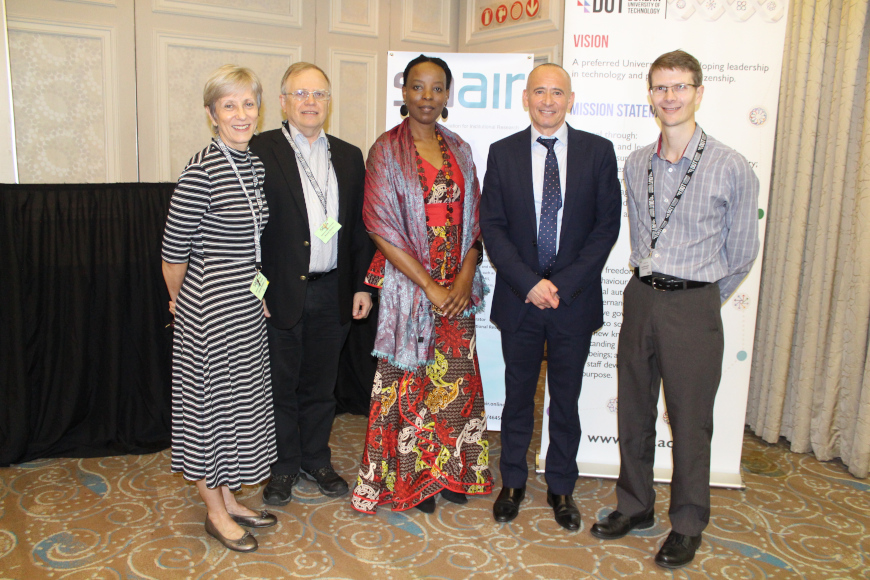The Executive Committee of the Southern African Association (SAAIR) and the Durban University of Technology are hosting the 25th Annual Conference of the SAAIR, at the Maharani Hotel in Durban, which began on Tuesday, 13 November 2018 and ends today, 15 November 2018.
SAAIR is a dynamic association with the vision of promoting institutional research, training and development, and the exchange of information in the context of an effective institutional research unit in each institution of Higher Education.
With the theme of the conference being: Re-imagining our universities: the role and impact of institutional research in times of disruption, the 2018 conference is focusing around the uptake of higher education research, either through Higher Education (HE) scholarly research output and/or through the work of institutional researchers that largely evidences as grey literature in the form of policy documents and reports.
On the first day of the 2018 conference, the Director: Institutional Planning at DUT and SAAIR 2018 Conference Chair, Nicky Muller thanked all the local and international academic delegates for their attendance, adding that the major purpose of the conference is to contribute significantly to the understanding, planning and effectiveness of higher education institutions and systems in the Southern African region.
Officially welcoming the local and international 144 delegates to the conference was SAAIR President, Dr Juan-Claude Lemmens, who gave a brief overview of the history of the SAAIR and said the association exposes its members to diverse thinking and applications of research principles and methodologies beyond the lens of Higher Education practice.
“It was also decided on the onset that the focus of the SAIR should be on Southern Africa and such a conference will allow delegates to share their research via various platforms, encouraging development and building a synergistic network of higher education institutional research (IR) professionals and practitioners in Southern Africa and beyond. While you engage with your colleagues at this conference, also think about how you can advance SAAIR and ultimately your role as an IR professional. Having said that I am sure you are all are looking forward to a though-provoking conference and engaging discussions with your colleagues. Do keep in mind that through-out this conference that you are making history by being part of this conference and that you are also part of the future of SAAIR,” he said.
Also welcoming the delegates to the prestigious event was DUT’s DVC: Research, Innovation and Engagement Prof Sibusiso Moyo. She added that delegates had come to Durban which is the best and warmest place to be. She thanked the DUT team, especially Nicky Muller, for putting such a conference together. She also spoke on the importance of having collaborations and spoke of DUT working closely with the eThekwini Municipality for student placements.
She also spoke of DUT and its agenda with regards to research, adding that the University is focusing on staff and student development programmes, especially for staff to have quality, key qualifications. “It will be vital to see what some of the outcomes will be from such a conference that can make the changes in the institution that you are in,” she said.
Kicking off the proceedings for day one was keynote speaker Angel Calderon, who is the Principal Advisor Planning and Research at the RMIT University in Australia. He has also worked as a journalist and foreign correspondent in several countries. He is a regular speaker on international forums on global megatrends, university rankings, higher education competitiveness, strategy and development.
His presentation was titled: Institutional Research at the crossroads: the impact of technology and global forces on the profession. He spoke about the drivers of change, challenges and opportunities for South Africa Higher Education.
He also focused on technology and its profound impact it has on our lives.
“Technological changes have contributed to making education more accessible and affordable for those who seek it, and less costly for providers. However, the persuasive effects of technology is automation which is depriving many people of employment and therefore of an ability to feel integrated in the global economy. An increased pace of automation in the labour market means that governments must develop new policies to protect the vulnerable while reaping the gains of new technologies,” he stressed.
Calderon also spoke on research endeavours which are central to the mission of universities and for being relevant locally and globally.
“Global rankings has intensified its focus on prestige derived from research. More institutions are seeking to reach the top and to publish or perish to demonstrate talent,” he said.
He added in terms of looking ahead, the idea of institutional research and planning should remain in force but in practice institutions are at the mercy of restructuring, resourcing, realignment and competition from within the institution.
Calderon stressed that institutions needed to embrace and harness technology to remain viable, relevant and competitive. “Going forward, the aim should be to promote, nurture and cross-pollinate professional practice. Despite the many challenges, institutions must remain optimistic about the road that lies ahead,” he said.
Pictured: SAAIR 2018 Conference Chair, Nicky Muller, Professor Jan Botha, DUT’s Prof Sibusiso Moyo, keynote speaker Angel Calderon and SAAIR President Dr Juan-Claude Lemmens, at the 2018 conference.
Waheeda Peters


